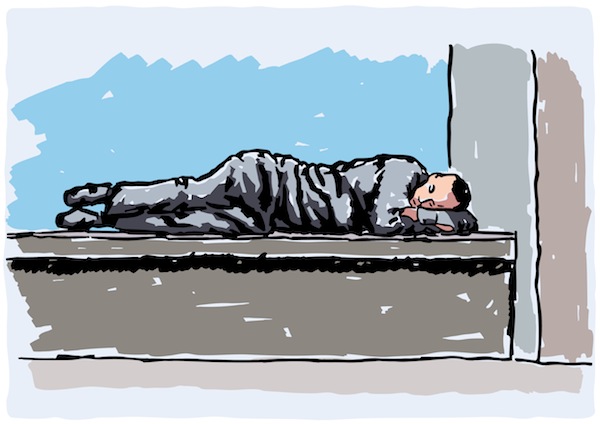Home office policy on EU rough sleepers ‘unlawful’, rules court
The number of EU citizens being removed from the UK has increased five-fold since 2010. Although the Home Office say they don’t keep the figures, one of the main targets of these enforced removals appears to be EU citizens on the move who sleep rough. Through the adoption of an unprecedented – at EU level – piece of legislation, the UK has made sleeping rough a sufficient reason to forcibly remove EU nationals. This implies that even those who are working but cannot afford a place to live, may be subject to administrative removal.
Critics have long argued that Home Office policy and practice around EU rough sleeping displays scant regard for EU treaties, the need to give effect to their object and purpose, or for the rights that arise under them. Instead the policy empties the content out of EU Citizenship and of rights of free movement, by militating against both and confining them in an over-determined system of immigration control which seems contrary to EU law.
Today the High Court, in a case brought by Lambeth Law Centre, and in which the AIRE Centre intervened, agreed with that view.
Mrs. Justice Lang DBE has now ruled that current and previous Home Office policy and practice in respect of rough sleepers was unlawful, being contrary to EU law, discriminatory, and amounting in practice to systematic verification. A revised policy, which has not yet received ministerial approval, was published shortly before the hearing, on 30 October 2017. Mrs Justice Lang declined to give guidance on the lawfulness of this revised policy but suggested the Secretary of State should ‘take stock and re-consider the terms of the proposed revised policy, in the light of advice from her legal advisers’.
As is well known by now, EU citizens have free movement rights that perforate the immigration control otherwise exercised by an EU member state. EU citizens and their family members enjoy rights of free movement in the UK under the EU treaties (the Citizenship and free movement provisions of Articles 20 and 21 of the TFEU); EU Directive 2004/38/EC and – as a matter of UK law – under the European Communities Act 1972, the Immigration Act 1988 and the Immigration (European Economic Area) Regulations 2016.
EU Citizens and their family members enjoy the right of admission to the UK and thereafter, rights of residence, by operation of law and on satisfaction of certain prescribed conditions. A right of permanent residence may be acquired after a period of continuous residence in the UK, usually five years, although a shorter period suffices in particular cases.
The concept of an ‘abuse of rights’ (which is a general principle of EU law) applies in the context of the free movement of people through Article 35 of the Citizens Rights Directive. Two general conditions must be satisfied in abuse cases:
- There must be a subjective element, namely an intention to obtain an advantage from EU law by creating artificially the conditions required for obtaining it, and,
- There must be an objective element, namely the existence of a situation where despite formal observance of the conditions laid down by the EU rules, their purpose has not been achieved
While ‘abuse’ and, as now re-phrased by the Home Office, a ‘misuse’ of rights might, on a colloquial reading, appear to call for an examination of the way in which the right in question has been (or will be) exercised, in fact the correct focus is upon the way in which the right or benefit was acquired. Specifically, what has to be shown is the employment of artificial devices with the intent to generate the conditions which trigger the right, and in circumstances where the relevant right was never intended to apply.
The European Court of Justice has shown extreme reluctance to find an abuse of rights in the context of the free movement of people. Indeed no case exists where the possibility has been considered other than as a hypothetical. This is not least because the free movement of persons is a principle of fundamental importance to the EU and any inroad into it requires severe scrutiny.
Home Office policy and practice
The Home Office has implemented its policy through planned operations targeting EEA rough sleepers.
Instead of starting from the assumption that they are citizens of a common European home entitled to be working, self-employed, seeking work etc. in the UK, or to be the family member of such a person, the Home Office has sought to administratively remove these individuals (through Regulation 26 of 2016 EEA Regulations), or asks them to leave the UK ‘voluntarily’. This is notwithstanding that they have not sought access to social assistance nor done anything criminal so as to meet the public policy threshold risk which might warrant their being considered for deportation (which carries an automatic ban on re-entry).
Many of the EU rough sleepers are vulnerable, economically (through working in sectors such as the building trade, hospitality, or catering, where they may be paid cash in hand), or due to being the victims of organised crime (women and men trafficked to the UK for the purposes of sexual and labour exploitation)
The Home Office argued in Court that rough sleeping was capable of meeting the EU test for an abuse of rights and was indeed an indicator of abuse (now ‘misuse’ under the latest policy version) of EU free movement law. Rough sleeping allowed them, they said, to trigger an investigation of the individual found to be sleeping rough, to detain them in appropriate circumstances, and administratively remove them. However the High Court disagreed, stating:
- Rough sleeping could not constitute an ‘abuse of rights’ within the meaning of article 35 of the Directive (as implemented by regulation 26 of the 2016 Regulations). There was no basis for concluding that, by sleeping rough, a person who otherwise satisfied the conditions for residence, had undermined the purpose/s of the Directive. Accommodation, or the lack thereof, in the host Member State had no connection to freedom of movement rights and requirements, and was not a factor taken into account in the EU Treaties or Directive. It made no difference whether the Home Office policy was to treat rough sleeping ipso facto as an abuse of rights, or only to treat intentional, harmful rough sleeping as an abuse. Nor could rough sleepers be said to be engaging in an activity which artificially created the conditions required to satisfy the requirements in the Regulations
- The policy was discriminatory because it accorded less favourable treatment to EEA nationals who were rough sleepers, on the ground of nationality and there was no justification for the less favourable treatment.
- The application of the policy was also unlawful because it amounted to systematic verification, which is expressly prohibited under both the Directive and UK Regulations. The evidence showed that the initial questioning and verification was part of a blanket policy, which only occurred because, under the terms of the policy, EEA nationals rough sleeping were presumed to be abusing their EEA rights of residence. This was also the very reason why this group were specifically were targeted on the streets by police/immigration officers.
Home Office policy and practice in this area demonstrates a failure, conscious or otherwise, to recognise EU Citizenship and free movement rights. By treating such rights as narrowly drawn immigration entitlements and by introducing policies and practices seemingly incompatible with EU law, it has put the UK in the position of breaching international treaty obligations. On a human level they have also made the situation of people who should be receiving help and support, even more precarious and difficult. Today’s High Court judgment provides a welcome brake on this part of the government’s ‘hostile environment’ agenda.







